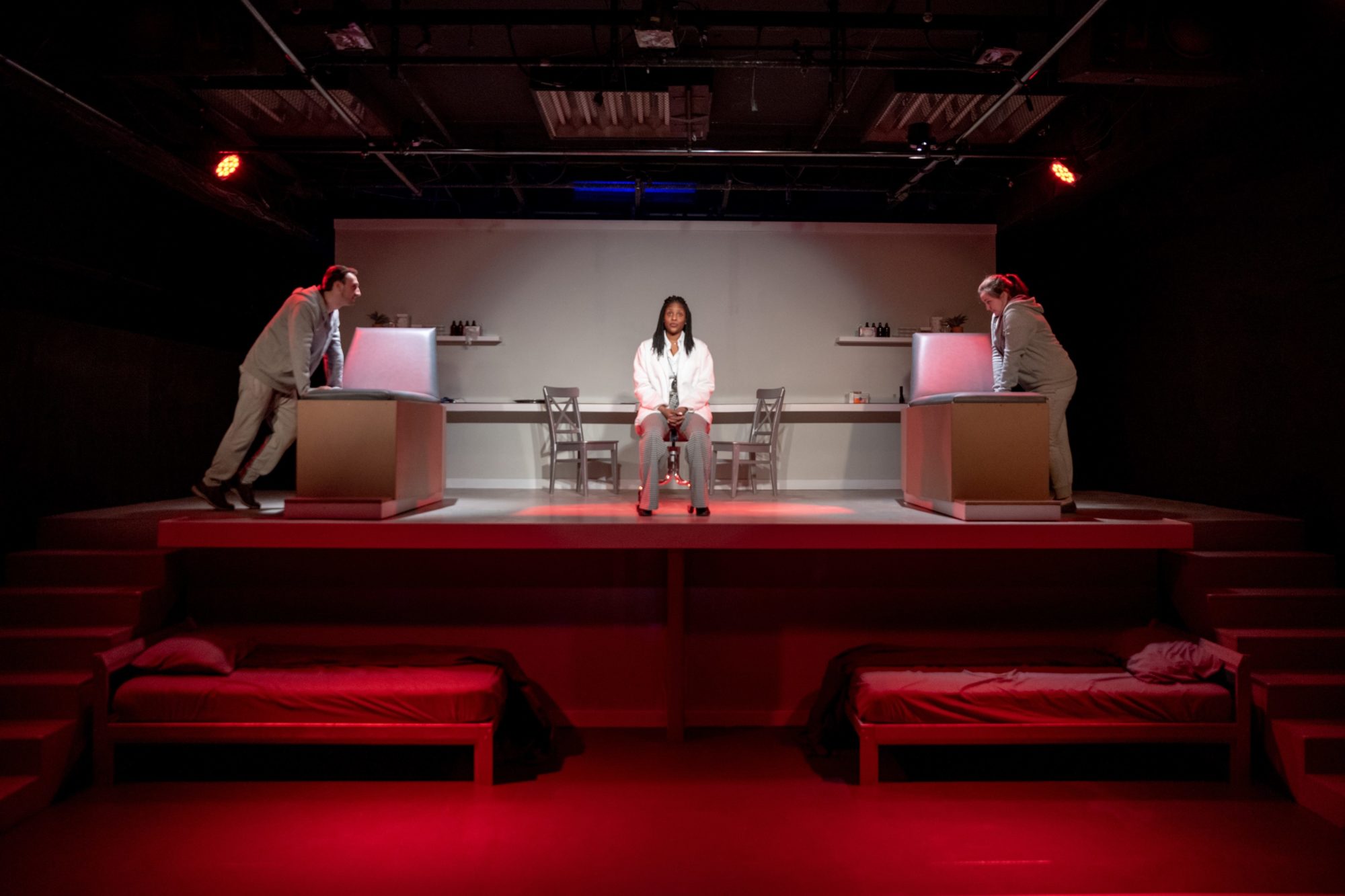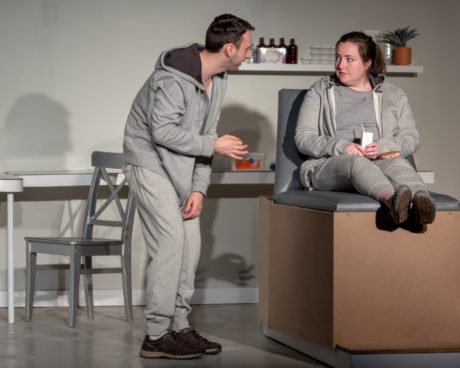It is impossible to ignore how closely the plot of The Effect, which opened Friday night at Fells Point Corner Theater – and in which two impressionable, screwed up young people are inextricably drawn to each other while participating a clinical drug trial – uncannily recalls the recent Netflix show Maniac.

Each features unlikely love, unknowable depths, and a pair of emotionally and sexually repressed psychologists who administer an ethically dubious research study – one that poses more questions than answers.
While Maniac fixates on the fractal reverberations of past trauma, The Effect wonders whether love is real or merely a chemical byproduct (or a “side effect,” in the lingo). If the metaphor seems a little obvious, then well, yeah, it is.
Lucy Prebble’s script could be forgiven for its didactically dosed themes of love (how do we know if it’s real?) and death (my god, it’s everywhere!) if it paid more attention to the characters whose love it obsesses over.
We know very little about Connie (played with nuance by Meghan Stanton), a mild-mannered student at the local university. She studies psychology. She’s dating a professor in his 40s (not hers, she notes). She claims she’s not depressed, but isn’t very convincing (“are you telling me or asking me?” the doctor replies).
Tristan (Nate Krimmel) however is a – wait for it – rambunctious and free-spirited screw-up (“I’m alive to possibility,” he says). He convinces Connie to climb out a fire escape and explore an abandoned asylum (presumably annexed to the hospital). He thinks taking drugs is cool. He impulsively invites Connie to “come away” with him.
Connie, at first reserved, thinks drugs are just a way of “distracting yourself from the fact that you and everyone you know is going to die.” When they finally do hook up, the intimate moment is skipped through in a blinking light jump-cut sequence: first emotional pleas, then fighting, sharing of weird secrets, planning a life together in Europe. The rushed staging magnifies the sense that their love is unearned.
Prebble’s undergrad existentialism animates the doctors too, and each, as you can imagine, burnishes their own psychological hang-ups.
Dr. Lorna James (a very capable Mia Robinson) struggles with her own tightly buttoned-up depressive tendencies, but refuses help out of a deep suspicion of antidepressants (“emotions are a response to the world,” she insists). Scientific debate predictably spills over into personal romantic hang-ups; it’s hardly a surprise when a flashback recalls the two doctors in bed together.
Her counterpart, Dr. Toby Sealy (Gareth Kelly), an older doctor with a bruised ego whom she met after he gave a talk at a conference and spilled cigarette ash on her thigh (“show me the bruise,” he coyly nudges after), disagrees. Sadness is like any other disease, and it’s curable. We could make a “Viagra for the heart,” he muses to her in one of their long debates about brain science.
Toby has had a chip on his shoulder since childhood. Holding a steel bucket and a pickled brain, he soliloquizes to the audience in a one-off scene about his arrogant doctor dad, who derided psychology as “crap about Freud and how we’re obsessed with our parents.” Naturally, Toby became a psychologist to prove his father wrong.

The clinical setting becomes inextricably bound with the passions and frustrations of its characters. “How do you feel right now?” Tristan asks Connie again and again, in their exhausting, recursive repartees, where they interrogate each other’s thoughts and motivations.
Between long and often stiff debates, the show gets a jolt of energy each time there’s a “dosage increase.” Tristan and Connie swallow their pills in tune with flashing green lights and a pounding, industrial house track (lighting design by Chris Allen); these interludes are the few moments when Andrew Porter’s direction comes close to matching the manic energy the characters display with each other. The drug (or is it a drug?) makes them act like they’re on MDMA: they’re hyper, impulsive, jittery, clumsily fumbling over each other’s bodies.
Of course, love like this cannot last. The trial takes a turn for the worse, and the pair must decide not only if it was a romance of circumstance, but also if they are really the people they think they are. Which is who, exactly?
Running Time: Two hours and 5 minutes, with a 15-minute intermission.
The Effect runs through March 17, 2019, at Fells Point Corner Theatre, 251 South Ann Street, Baltimore, MD. For tickets, go online.
Director, Andrew Porter; Stage Manager, Alex Liam Perry; Set Designer, Bruce Kapplin; Lighting Designer, Chris Allen; Props Designer, Gaya Sel; Scenic Artist, Jessica Rasp; Fight & Intimacy Director, Jonathan Ezra Rubin; Assistant Fight & Intimacy Director, Mallory Shear




